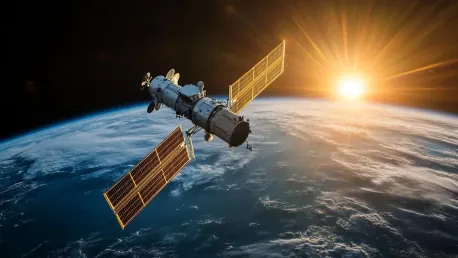Satellites have transitioned from their traditional roles in military, scientific, and weather applications into pivotal tools for commercial innovation. This transformation is fueled by technological advancements that place satellites at the forefront of business operations. Through enhanced operational efficiency and improved customer engagement, satellite-based technologies are now integral to driving business transformation across various sectors. In today’s data-driven world, organizations are increasingly relying on satellite capabilities to address complex challenges and seize emerging opportunities.
The growing importance of satellite technology in commercial activities cannot be overstated. As industries such as financial services and logistics integrate satellite solutions into their operations, the benefits become apparent. Satellites offer real-time insights, ensure constant connectivity, and maintain precise navigation and timing, all of which are crucial for modern business enterprises. Such technological advancements enable organizations to operate with greater efficiency and agility, allowing them to remain competitive in swiftly changing markets. Highlighting this impact, Paul Bate, CEO of the UK Space Agency, notes that satellite services contribute significantly to the economy. The agency’s “Unlocking Space for Business” program has successfully engaged over 350 companies, demonstrating the expanding role of satellite technologies in fostering business growth and innovation.
The Growing Importance of Satellite Technology in Business
Across numerous sectors, the integration of satellite technologies has become essential for sustained growth and operational excellence. Businesses in fields ranging from financial services to logistics are leveraging the unique capabilities of satellites to gain real-time insights, ensure constant connectivity, and maintain precise navigation and timing. These technological advancements enable organizations to address complex challenges and seize new opportunities, thus positioning themselves competitively in a data-driven market.
Satellites contribute significantly to economies, exemplified by the fact that they support approximately £364 billion of the UK’s GDP. Paul Bate, CEO of the UK Space Agency, emphasizes the necessity for businesses to stay ahead of emerging technological opportunities. His insights underscore the critical role of satellite services, highlighting the agency’s “Unlocking Space for Business” program that has engaged over 350 companies to explore the benefits of satellite technologies. This initiative signifies the expanding role of satellite technology in fostering business innovation and driving commercial success.
Earth Observation: Gathering Actionable Insights
Earth observation technologies are revolutionizing how businesses gather and utilize actionable intelligence. Using diverse sensors, these technologies monitor physical, chemical, and environmental changes on Earth, providing critical business value through change detection, remote monitoring, and consistent insights. By capturing standardized data, companies can make comparisons over time and across geographies, allowing for more informed decision-making processes.
Applications of earth observation are extensive, including tracking deforestation, urban expansion, and other environmental shifts. These capabilities have significant implications for various industries. For instance, insurance companies like RSA are leveraging satellite imagery to develop innovative risk management solutions that go beyond traditional exposure assessments. These advancements allow businesses to identify potential risks and respond proactively, thereby reducing operational costs and improving overall efficiency.
Seamless Connectivity for a Global Reach
Reliable connectivity is indispensable for businesses that operate in areas with inadequate traditional infrastructure. Satellite technologies offer consistent and robust communication capabilities, ensuring that people, assets, and operations remain connected. This seamless connectivity fosters improved efficiency and operational resilience, especially during extreme weather conditions or infrastructure outages.
The practical applications of satellite connectivity are diverse, ranging from fixed and portable devices to the Internet of Things (IoT). For example, Intelligent Transport Systems UK highlights the significant impact of satellite connectivity on the transport network, emphasizing benefits like enhanced efficiency, asset monitoring, and route optimization. By ensuring continuous communication with key assets, companies can maintain smooth operations and deliver exceptional customer and staff experiences. This connectivity is crucial for business continuity, safety, and operational resilience.
Positioning, Navigation, and Timing (PNT): Precision and Accuracy
Satellite-derived Positioning, Navigation, and Timing (PNT) signals, such as those provided by GPS, are critical for accurate location, movement tracking, and time synchronization. These signals are essential for a wide range of applications, from logistics to trading platforms, where precision and timing are paramount. Businesses in various sectors rely on PNT data to ensure smooth operations and enhance their service delivery.
Companies can leverage PNT capabilities for global resilience and trusted synchronization. For instance, Wincanton is utilizing real-time optimization and accurate data collection to enhance its logistics operations. This approach leads to significant improvements in navigation and service delivery, allowing businesses to efficiently manage their routes and monitor their assets. The precision offered by satellite-derived PNT signals is indispensable for modern business operations, enabling companies to achieve greater accuracy and reliability in their processes.
The Convergence with Emerging Technologies
Satellites have evolved beyond their traditional military, scientific, and weather roles to become vital tools for commercial innovation. Technological advancements position satellites at the core of business operations, enhancing efficiency, improving customer engagement, and creating new growth opportunities. Today, as organizations navigate a data-driven world, they increasingly depend on satellite capabilities to tackle complex challenges and seize emerging opportunities.
The growing significance of satellite technology in commercial activities is undeniable. Industries like financial services and logistics benefit from integrating satellite solutions into their operations since satellites offer real-time insights, constant connectivity, and precise navigation and timing—essential for modern enterprises. These advancements enable companies to operate with greater agility and efficiency, staying competitive in rapidly changing markets. As Paul Bate, CEO of the UK Space Agency, highlights, satellite services substantially contribute to the economy. The agency’s “Unlocking Space for Business” program has engaged over 350 companies, showcasing the expanding role of satellite technologies in fostering business growth and innovation.









